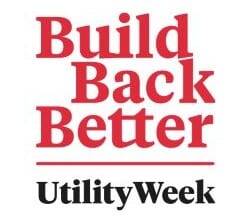You’ve reached your limit!
To continue enjoying Utility Week Innovate, brought to you in association with Utility Week Live or gain unlimited Utility Week site access choose the option that applies to you below:
Register to access Utility Week Innovate
- Get the latest insight on frontline business challenges
- Receive specialist sector newsletters to keep you informed
- Access our Utility Week Innovate content for free
- Join us in bringing collaborative innovation to life at Utility Week Live

The reach of utilities firms into disadvantaged areas is a rare commodity, which can be harnessed to great effect when it comes to driving social mobility, say Rt Hon Justine Greening, Social Mobility Pledge founder and former Education Secretary; and Louise Beardmore, Customer Services and People Director at United Utilities

Utilities firms are particularly well placed to play a major role in rebuilding the UK economy when the coronavirus crisis finally ends. As organisations with direct influence on households, including those in disadvantaged communities, they are in a position to engage and support what are often hard-to-reach families and individuals.
 They are also potent generators of opportunities. Onsite, across vast supply chains and in the many innovative ways utility firms are diversifying, an abundance of new career openings are being created.
They are also potent generators of opportunities. Onsite, across vast supply chains and in the many innovative ways utility firms are diversifying, an abundance of new career openings are being created.
Many are a doorway into a trade or profession in high demand, and loaded with career progression opportunities. These are the types of roles that the economy needs to come back stronger after Covid -19.
The reach of utilities firms into disadvantaged areas is a rare commodity, which can be harnessed to great effect when it comes to driving social mobility.
Before coronavirus, Britain was a nation of inequality. Talent was spread evenly around the UK but opportunities were not and where a person was born dictated their career trajectory.
Sadly, the pandemic could only make this picture bleaker.
That is unless businesses take up the call to do their bit to support the recovery.
In doing so, by making bold decisions and adopting a mindset that finds and rewards talent regardless of its background, it can also help their businesses to grow and become more resilient.
Utilities need to step up
Through our work with the Social Mobility Pledge, we have seen a number of utilities businesses achieving formidable results in enabling people to fulfil their potential and dramatically improve their career outlook.
This must be stepped up post-coronavirus, but so too must the vital work of utilities companies in supporting households in financial difficulty.
United Utilities services a North West region which is home to four in 10 of the country’s most deprived communities.
And the company has been able to leverage its direct links to such areas to facilitate a widening access to opportunities, and demonstrate how businesses can really be a force for the greater good.
At the last count in 2019/20, it helped 15,000 customers to become debt free, while 25,000 are currently being supported by payment matching schemes; which help them to better manage their household finances.
Furthermore, the company’s Priority Services register, which identifies vulnerable customers who need extra support, has grown by 25,000 people in the last year.
Among them are people like ‘Chris’, who’d never experienced problems paying his bills until he was made redundant. He contacted United Utilities to find out if he could receive support until he found a new job.
He was given a three-month payment break until he found new employment, while the cost of his delayed payments were subsequently spread over 18 months.
He was also signposted to organisations providing free financial advice for people facing redundancy and an online benefits calculator to check he wasn’t missing out on any funds he was entitled to.
Similarly supportive measures have been delivered via a trust fund set up for people unable to pay their bills, and the Managing Your Money programme; which came out of a partnership between United Utilities and Youth Focus North West, aimed at better understanding the concerns of young people today.
With money worries coming to the fore, the company developed a money management online learning module in support of the UK Youth Parliament’s ‘Curriculum for Life’ initiative.
Of course, United Utilities is not alone as a utilities company that has recognised its capacity to support people in difficult circumstances at these most challenging times.
As the nation looks to come out of the coronavirus crisis, however, more purposeful activity is needed, from any business able to deliver it.
Even without the backdrop of the crisis and its economic fallout, purpose and profitability are increasingly becoming inseparable.
And this trend will only accelerate as demand for help intensifies in the wake of the pandemic.
Help with re-skilling
As entire sectors are decimated, boosting employability and up-skilling will be crucial in enabling those affected to find a new path in life.
This great effort requires a collaborative approach, with businesses often operating as a facilitator, rather than trying to solve all problems themselves.
Certainly, United Utilities has been able to collaborate with influential parties across the North West in helping to unlock potential in disadvantaged communities. This is underpinned by a commitment to helping opportunity flow.
A key strategy in this has been to target opportunities at those who face the most barriers in accessing them. For example, United Utilities’ Youth Programme aimed a NEETs has been able to get almost 80 per cent of participants into paid employment since it started in 2014.
Twenty-year-old Liam Robinson’s story is a shining example of this work in action. The budding footballer’s career was cut short through injury and faced an uncertain future.
With few qualifications and no work experience outside football, his options were extremely limited. But after joining the United Utilities Youth Programme, he was able to secure employment at one of the company’s partners, Sapphire Utility Solutions, and now has managerial ambitions.
This type of intervention, which unlocks potential and sets people on the path towards social mobility, is needed now more than ever.
For utility businesses this is an opportunity to play their part in the post-Covid recovery, while also adding fresh talent and dynamism to their workforces and throughout their supply chains. It’s a moment that must be seized.




Please login or Register to leave a comment.